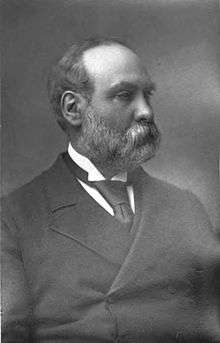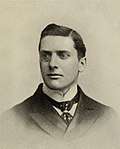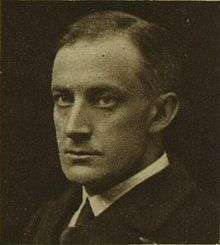East Worcestershire (UK Parliament constituency)
East Worcestershire was a county constituency in the county of Worcestershire, represented in the House of Commons of the Parliament of the United Kingdom.
| East Worcestershire | |
|---|---|
| Former County constituency for the House of Commons | |
| 1832–1918 | |
| Number of members | 1832–1885: two; 1885–1918: one |
| Replaced by | Kidderminster and Birmingham King's Norton |
It was created by the Reform Act 1832 for the 1832 general election, and elected two Members of Parliament (MPs), by the bloc vote system. Under the Redistribution of Seats Act 1885, its representation was reduced to one MP for the 1885 general election, elected by the first past the post voting system. The constituency was abolished for the 1918 general election.
Boundaries
1832–1885: The Petty Sessional Divisions of Stourbridge, Dudley, Droitwich, Northfield, Blockley and Pershore, and the Borough of Evesham.[1]
Members of Parliament
MPs 1832–1885
| Election | 1st Member | 1st Party | 2nd Member | 2nd Party | ||
|---|---|---|---|---|---|---|
| 1832 | William Congreve Russell | Whig[2] | Thomas Cookes | Whig[2] | ||
| 1835 | Edward Holland | Whig[3][4][2] | ||||
| 1837 | Sir Horace St Paul, Bt | Conservative[2] | John Barneby | Conservative[2] | ||
| 1841 | James Arthur Taylor | Conservative[2] | ||||
| Jan. 1847 by-election | George Rushout-Bowles | Conservative | ||||
| Jul. 1847 | John Hodgetts-Foley | Whig[5][6][7] | ||||
| Feb. 1859 | Hon. Frederick Gough-Calthorpe | Whig[8][9][10] | ||||
| Apr. 1859 | Liberal | Liberal | ||||
| 1861 by-election | Harry Vernon | Liberal | ||||
| Jun. 1868 by-election | Hon. Charles Lyttelton | Liberal | ||||
| Nov 1868 | Richard Amphlett | Conservative | ||||
| 1874 | Henry Allsopp | Conservative | Thomas Eades Walker | Conservative | ||
| 1880 | William Henry Gladstone | Liberal | George Hastings | Liberal | ||
| 1885 | representation reduced to one member | |||||
MPs 1885–1918
| Year | Member | Party | |
|---|---|---|---|
| 1885 | George Hastings | Liberal | |
| 1886 | Liberal Unionist | ||
| 1892 | Austen Chamberlain | Liberal Unionist | |
| 1912 | Unionist | ||
| 1914 | Leverton Harris | Unionist | |
| 1918 | constituency abolished | ||
Elections
| Decades: |
Elections in the 1830s
| Party | Candidate | Votes | % | ||
|---|---|---|---|---|---|
| Whig | William Congreve Russell | 2,576 | 36.8 | ||
| Whig | Thomas Henry Cookes | 2,517 | 35.9 | ||
| Tory | John Pakington | 1,916 | 27.3 | ||
| Majority | 601 | 8.6 | |||
| Turnout | 4,348 | 84.2 | |||
| Registered electors | 5,161 | ||||
| Whig win (new seat) | |||||
| Whig win (new seat) | |||||
| Party | Candidate | Votes | % | ± | |
|---|---|---|---|---|---|
| Whig | Edward Holland | 2,254 | 34.2 | −2.6 | |
| Whig | Thomas Henry Cookes | 2,192 | 33.3 | −2.6 | |
| Conservative | Horace St Paul | 2,145 | 32.5 | +5.2 | |
| Majority | 47 | 0.7 | −7.9 | ||
| Turnout | c. 3,296 | c. 63.8 | c. −20.4 | ||
| Registered electors | 5,164 | ||||
| Whig hold | Swing | −2.6 | |||
| Whig hold | Swing | −2.6 | |||
| Party | Candidate | Votes | % | ± | |
|---|---|---|---|---|---|
| Conservative | Horace St Paul | 2,595 | 27.4 | +11.2 | |
| Conservative | John Barneby | 2,528 | 26.7 | +10.5 | |
| Whig | Edward Holland | 2,175 | 23.0 | −11.2 | |
| Whig | John Hodgetts-Foley | 2,168 | 22.9 | −10.4 | |
| Majority | 353 | 3.7 | N/A | ||
| Turnout | 4,771 | 79.6 | c. +15.8 | ||
| Registered electors | 5,995 | ||||
| Conservative gain from Whig | Swing | +11.0 | |||
| Conservative gain from Whig | Swing | +10.7 | |||
Elections in the 1840s
| Party | Candidate | Votes | % | ± | |
|---|---|---|---|---|---|
| Conservative | James Arthur Taylor | Unopposed | |||
| Conservative | John Barneby | Unopposed | |||
| Registered electors | 6,367 | ||||
| Conservative hold | |||||
| Conservative hold | |||||
Barneby's death caused a by-election.
| Party | Candidate | Votes | % | ± | |
|---|---|---|---|---|---|
| Conservative | George Rushout | Unopposed | |||
| Conservative hold | |||||
| Party | Candidate | Votes | % | ± | |
|---|---|---|---|---|---|
| Whig | John Hodgetts-Foley | Unopposed | |||
| Conservative | George Rushout | Unopposed | |||
| Registered electors | 6,269 | ||||
| Whig hold | |||||
| Conservative hold | |||||
Elections in the 1850s
| Party | Candidate | Votes | % | ± | |
|---|---|---|---|---|---|
| Whig | John Hodgetts-Foley | Unopposed | |||
| Conservative | George Rushout | Unopposed | |||
| Registered electors | 6,515 | ||||
| Whig hold | |||||
| Conservative hold | |||||
| Party | Candidate | Votes | % | ± | |
|---|---|---|---|---|---|
| Whig | John Hodgetts-Foley | Unopposed | |||
| Conservative | George Rushout | Unopposed | |||
| Registered electors | 6,065 | ||||
| Whig hold | |||||
| Conservative hold | |||||
Rushout succeeded to the peerage, becoming 3rd Baron Northwick and causing a by-election.
| Party | Candidate | Votes | % | ± | |
|---|---|---|---|---|---|
| Whig | Frederick Gough-Calthorpe | 2,304 | 54.0 | N/A | |
| Conservative | John Slaney Pakington[12] | 1,965 | 46.0 | N/A | |
| Majority | 339 | 7.9 | N/A | ||
| Turnout | 4,269 | 71.4 | N/A | ||
| Registered electors | 5,983 | ||||
| Whig gain from Conservative | Swing | N/A | |||
| Party | Candidate | Votes | % | ± | |
|---|---|---|---|---|---|
| Liberal | John Hodgetts-Foley | Unopposed | |||
| Liberal | Frederick Gough-Calthorpe | Unopposed | |||
| Registered electors | 5,983 | ||||
| Liberal hold | |||||
| Liberal gain from Conservative | |||||
Elections in the 1860s
Hodgetts-Foley's death caused a by-election.
| Party | Candidate | Votes | % | ± | |
|---|---|---|---|---|---|
| Liberal | Harry Vernon | Unopposed | |||
| Liberal hold | |||||
| Party | Candidate | Votes | % | ± | |
|---|---|---|---|---|---|
| Liberal | Harry Vernon | Unopposed | |||
| Liberal | Frederick Gough-Calthorpe | Unopposed | |||
| Registered electors | 6,875 | ||||
| Liberal hold | |||||
| Liberal hold | |||||
Gough-Calthorpe succeeded to the peerage, becoming 5th Baron Calthorpe and causing a by-election.
| Party | Candidate | Votes | % | ± | |
|---|---|---|---|---|---|
| Liberal | Charles Lyttelton | 2,688 | 52.5 | N/A | |
| Conservative | William Laslett | 2,429 | 47.5 | N/A | |
| Majority | 259 | 5.1 | N/A | ||
| Turnout | 5,117 | 74.4 | N/A | ||
| Registered electors | 6,875 | ||||
| Liberal hold | Swing | N/A | |||
| Party | Candidate | Votes | % | ± | |
|---|---|---|---|---|---|
| Conservative | Richard Amphlett | 4,108 | 34.3 | N/A | |
| Liberal | Charles Lyttelton | 4,093 | 34.1 | N/A | |
| Liberal | Richard Martin | 3,789 | 31.6 | N/A | |
| Majority | 15 | 0.1 | N/A | ||
| Turnout | 8,049 (est) | 78.0 (est) | N/A | ||
| Registered electors | 10,313 | ||||
| Conservative gain from Liberal | Swing | N/A | |||
| Liberal hold | Swing | N/A | |||
Elections in the 1870s
| Party | Candidate | Votes | % | ± | |
|---|---|---|---|---|---|
| Conservative | Henry Allsopp | 4,421 | 29.5 | +12.3 | |
| Conservative | Thomas Eades Walker | 4,159 | 27.8 | +10.6 | |
| Liberal | Charles Lyttelton | 3,508 | 23.4 | −10.7 | |
| Liberal | Arthur Albright[13] | 2,831 | 18.9 | −12.7 | |
| Conservative | William Laslett | 55 | 0.4 | N/A | |
| Majority | 651 | 4.3 | +4.2 | ||
| Turnout | 7,487 (est) | 67.8 (est) | −10.2 | ||
| Registered electors | 11,039 | ||||
| Conservative hold | Swing | +12.0 | |||
| Conservative gain from Liberal | Swing | +11.2 | |||
Elections in the 1880s

| Party | Candidate | Votes | % | ± | |
|---|---|---|---|---|---|
| Liberal | William Henry Gladstone | 4,879 | 26.5 | +3.2 | |
| Liberal | George Hastings | 4,833 | 26.3 | +7.4 | |
| Conservative | Richard Temple | 4,417 | 24.0 | −3.8 | |
| Conservative | Henry Allsopp | 4,258 | 23.2 | −6.3 | |
| Majority | 416 | 2.3 | N/A | ||
| Turnout | 9,194 (est) | 76.6 (est) | +8.8 | ||
| Registered electors | 12,000 | ||||
| Liberal gain from Conservative | Swing | +3.5 | |||
| Liberal gain from Conservative | Swing | +6.9 | |||
| Party | Candidate | Votes | % | ± | |
|---|---|---|---|---|---|
| Liberal | George Hastings | 3,685 | 53.6 | +0.8 | |
| Conservative | Albert Bosanquet | 3,194 | 46.4 | −0.8 | |
| Majority | 491 | 7.2 | +4.9 | ||
| Turnout | 6,879 | 84.0 | +7.4 (est) | ||
| Registered electors | 8,187 | ||||
| Liberal hold | Swing | +0.8 | |||
| Party | Candidate | Votes | % | ± | |
|---|---|---|---|---|---|
| Liberal Unionist | George Hastings | Unopposed | |||
| Liberal Unionist gain from Liberal | |||||
Elections in the 1890s
Hastings was expelled from the House of Commons, causing a by-election.

| Party | Candidate | Votes | % | ± | |
|---|---|---|---|---|---|
| Liberal Unionist | Austen Chamberlain | Unopposed | |||
| Liberal Unionist hold | |||||
| Party | Candidate | Votes | % | ± | |
|---|---|---|---|---|---|
| Liberal Unionist | Austen Chamberlain | 5,111 | 67.0 | N/A | |
| Liberal | Oscar Browning | 2,517 | 33.0 | N/A | |
| Majority | 2,594 | 34.0 | N/A | ||
| Turnout | 7,628 | 77.6 | N/A | ||
| Registered electors | 9,827 | ||||
| Liberal Unionist hold | |||||
| Party | Candidate | Votes | % | ± | |
|---|---|---|---|---|---|
| Liberal Unionist | Austen Chamberlain | Unopposed | |||
| Liberal Unionist hold | |||||
Elections in the 1900s
| Party | Candidate | Votes | % | ± | |
|---|---|---|---|---|---|
| Liberal Unionist | Austen Chamberlain | Unopposed | |||
| Liberal Unionist hold | |||||
| Party | Candidate | Votes | % | ± | |
|---|---|---|---|---|---|
| Liberal Unionist | Austen Chamberlain | Unopposed | |||
| Liberal Unionist hold | |||||
_Austen_Chamberlain.jpg)
| Party | Candidate | Votes | % | ± | |
|---|---|---|---|---|---|
| Liberal Unionist | Austen Chamberlain | 10,129 | 63.7 | N/A | |
| Liberal | John Morgan | 5,763 | 36.3 | N/A | |
| Majority | 4,366 | 27.4 | N/A | ||
| Turnout | 15,892 | 84.7 | N/A | ||
| Registered electors | 18,769 | ||||
| Liberal Unionist hold | |||||
Elections in the 1910s

| Party | Candidate | Votes | % | ± | |
|---|---|---|---|---|---|
| Liberal Unionist | Austen Chamberlain | 12,644 | 64.5 | +0.8 | |
| Liberal | Hilton Young | 6,955 | 35.5 | -0.8 | |
| Majority | 5,689 | 29.0 | +1.6 | ||
| Turnout | 84.2 | -0.5 | |||
| Liberal Unionist hold | Swing | +0.8 | |||
| Party | Candidate | Votes | % | ± | |
|---|---|---|---|---|---|
| Liberal Unionist | Austen Chamberlain | Unopposed | |||
| Liberal Unionist hold | |||||
| Party | Candidate | Votes | % | ± | |
|---|---|---|---|---|---|
| Unionist | Leverton Harris | Unopposed | |||
| Unionist hold | |||||
General Election 1914/15:
Another General Election was required to take place before the end of 1915. The political parties had been making preparations for an election to take place and by July 1914, the following candidates had been selected;
- Unionist: Leverton Harris
- Liberal: Wilfrid Hill
References
- "The statutes of the United Kingdom of Great Britain and Ireland. 2 & 3 William IV. Cap. LXIV. An Act to settle and describe the Divisions of Counties, and the Limits of Cities and Boroughs, in England and Wales, in so far as respects the Election of Members to serve in Parliament". London: His Majesty's statute and law printers. 1832. pp. 300–383. Retrieved 2017-07-27.
- Stooks Smith, Henry (1845). The Parliaments of England, from 1st George I., to the Present Time. Vol II: Oxfordshire to Wales Inclusive. London: Simpkin, Marshall, & Co. pp. 127–128. Retrieved 11 August 2019 – via Google Books.
- Stooks Smith, Henry (1842). "English Contested Elections". The Register of Parliamentary Contested Elections; Containing the Uncontested Elections Since 1830 (Second ed.). London: Simpkin, Marshall, and Co. p. 175. Retrieved 7 May 2018.
- "General Election Returns". Roscommon and Leitrim Gazette. 7 February 1835. pp. 1–2. Retrieved 7 May 2018 – via British Newspaper Archive.
- "The Elections". Worcester Journal. 29 July 1847. p. 3. Retrieved 19 August 2018 – via British Newspaper Archive.
- "Election Intelligence". Morning Post. 22 July 1847. p. 3. Retrieved 19 August 2018 – via British Newspaper Archive.
- Stooks Smith, Henry (1845). The Parliaments of England, from 1st George I., to the Present Time. Vol II: Oxfordshire to Wales Inclusive. London: Simpkin, Marshall, & Co. p. 130. Retrieved 19 August 2018 – via Google Books.
- "Imperial Parliament". The Ipswich Journal. 26 February 1859. p. 3. Retrieved 19 August 2018 – via British Newspaper Archive.
- "East Worcestershire Election". Worcester Journal. 12 February 1859. p. 6. Retrieved 19 August 2018 – via British Newspaper Archive.
- "Election Intelligence". Cardiff Times. 26 February 1859. p. 5. Retrieved 19 August 2018 – via British Newspaper Archive.
- Craig, F. W. S., ed. (1977). British Parliamentary Election Results 1832-1885 (e-book)
|format=requires|url=(help) (1st ed.). London: Macmillan Press. pp. 484–485. ISBN 978-1-349-02349-3. - "East Worcestershire Election". Worcester Journal. 26 February 1859. p. 9. Retrieved 19 August 2018 – via British Newspaper Archive.
- "East Worcestershire Election". Worcestershire Chronicle. 21 February 1874. p. 5. Retrieved 23 January 2018 – via British Newspaper Archive.
- "East Worcestershire". Yorkshire Post and Leeds Intelligencer. 12 February 1874. p. 5. Retrieved 23 January 2018 – via British Newspaper Archive.
- Craig, F. W. S., ed. (1974). British Parliamentary Election Results: 1885-1918. London: Macmillan Press. p. 421. ISBN 9781349022984.
- The Liberal Year Book, 1907
- Debrett's House of Commons & Judicial Bench, 1886
- Craig, FWS, ed. (1974). British Parliamentary Election Results: 1885-1918. London: Macmillan Press. ISBN 9781349022984.
- Debrett's House of Commons & Judicial Bench, 1901
- Debrett's House of Commons & Judicial Bench, 1916
- Leigh Rayment's Historical List of MPs – Constituencies beginning with "W" (part 5)
- Craig, F. W. S. (1989) [1977]. British parliamentary election results 1832–1885 (2nd ed.). Chichester: Parliamentary Research Services. pp. 484–485. ISBN 0-900178-26-4.